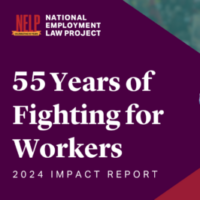Executive Summary
In Illinois and most of the United States, our employment laws allow employers to fire workers abruptly—without notice or even a good reason—and leave them with bills due and no paycheck or severance pay.

This hallmark of our employment law system—at-will firing—wreaks havoc on the lives of workers and their families. In this time of profound economic insecurity, the rug can be pulled out at any time from under the vast majority of workers who depend on their paychecks to survive. The at-will relationship underlies a large and enduring power imbalance between U.S. workers and their employers, granting employers inordinate control over workers’ livelihoods, undermining their bargaining power and ability to speak out at work, and perpetuating long standing racial and gender inequities in the workplace.
Public enforcement agencies, such as the Illinois and U.S. Departments of Labor, rely on worker complaints to bring violations of workplace laws such as the minimum wage and health and safety protections to their attention—but under the at-will system these agencies have great difficulty protecting workers who speak up from retaliation. Many workers turn to poor quality jobs—underpaid, dangerous and/or temporary—as a last resort and our tattered public safety net makes it nearly impossible for them to walk away from even an abusive or unsafe job. As a result, workers often accept working conditions that they know are bad, because speaking up comes with too great a cost—the risk of losing their paychecks and with them the ability to support themselves or their families. And by leaving workers unable to speak up safely about mistreatment and law breaking, at-will employment compromises public agencies’ access to the information they need to enforce our workplace and public health laws. This gap in our workplace enforcement system has received increased attention during the pandemic, as workers’ inability to sound the alarm about hazardous job conditions puts all of us in danger.
This report presents findings from a January 2021 survey administered to a representative sample of Illinois workers (n=806), which shows that unfair firings are widespread in the state and are having harmful effects. It also presents background on the growing movement to replace at-will termination with “just cause” employment protections, and recommendations for policy reform in Illinois.
Key findings of the survey include:
Unfair and arbitrary firings are widespread in Illinois.
- Almost half of Illinois workers have been fired or let go at some point in their lives.
- More than a third (37 percent) have had the experience of being fired or let go for unfair reasons.
- Of workers who were fired, 42 percent said they weren’t given a reason at all.
- Of workers who were fired, only one in four reported being given fair warning and a chance to improve before being terminated. Even fewer (15 percent) said they were offered more training.
- 71 percent of Illinoisans who had been fired or let go took on new debt to make ends meet.
Workers feel pressured to accept harmful workplace conditions because of fear.
- A third of Illinois workers (32 percent) say that fear of being fired or disciplined would prevent them from raising workplace health and safety concerns to their employer.
- More than two in three workers (68 percent) reported that they or a co-worker worked when sick or injured to avoid being fired.
- 41 percent report that an employer pressured them or a co-worker to accept wage theft (working extra hours without pay) in order to avoid being fired. Employees of the largest companies were the most likely to report this having happened.
- Two out of three workers also reported that they or a co-worker worked overtime when they preferred not to or skipped breaks in order to avoid being fired.
Many Illinois families are one paycheck away from hardship.
- About half of all Illinois workers said that if they lost their job today it would be difficult to make their next rent or mortgage payment.
- Women were twice as likely as men to report living paycheck to paycheck. One in four Illinois women report not having enough savings to cover even 2 weeks of expenses if they became unemployed today, compared to one in eight men.
At-will firings reinforce systemic racism in the workplace.
- Black workers are most likely to have experienced unfair discharges—41 percent as compared to 32 percent of Latinx workers and 35 percent of white workers.
- Latinx and Black workers were much more likely to have experienced unfair discipline at work, with 46 percent and 42 percent reporting such experiences, respectively, as compared to just 36 percent of white workers.
- Latinx workers are much more likely than other workers to report that they or a co-worker worked under harmful conditions out of fear of firing or discipline.
Retaliation against workers who speak up about job conditions is common and workers report being afraid to file complaints with public agencies out of fear of being punished.
- One out of three workers who have been fired or let go (33 percent) report that they were terminated for speaking up about problems on the job.
- Additionally, many Illinois workers (31 percent) have witnessed a co-worker lose their job for speaking up about problems on the job.
- More than one in four (29 percent) Illinois workers say they or a co-worker has refrained from filing a complaint with a government agency about workplace problems for fear of employer retaliation.
These findings paint a vivid picture of the wide-ranging negative impacts of at-will firings in Illinois. In the past two years, momentum has been growing across the country to replace the at-will system with “just cause” standards. Such standards would require that employers provide legitimate reasons and fair warnings before terminating workers. In 2019, Philadelphia’s city council passed a new law guaranteeing parking lot workers just cause employment protections. In 2021, New York City passed similar protections for fast food employees—a sector where workers had complained about poor working conditions. Presidential candidates such as Senator Bernie Sanders included proposals for a national just cause law in their 2020 campaign platforms. Many polls show that voters of all parties and demographic groups strongly support just cause policies including a 2020 Data for Progress poll which found that just cause laws were supported by 67 percent of likely voters, including 73 percent of Democrats and 64 percent of Republicans.
State lawmakers have the opportunity to make Illinois a leader among states by adopting The Secure Jobs Act (HB3530, SB2332), which would extend just cause employment protections to workers across the state. Doing so will help end unfair firings and protect workers, families, and communities in Illinois as we recover from the COVID-19 pandemic and rebuild our economy.
Download the report to read more.
Related to
Related Resources
All resourcesShernice Mundell, Former Federal Employee

Worker Voices
2025 NELP Policy and Advocacy Agenda

Policy & Data Brief
2024 Impact Report: 55 Years of Fighting for Workers

Report



